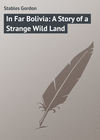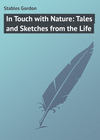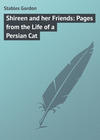Czytaj książkę: «Our Home in the Silver West: A Story of Struggle and Adventure»
CHAPTER I.
THE HIGHLAND FEUD
Why should I, Murdoch M'Crimman of Coila, be condemned for a period of indefinite length to the drudgery of the desk's dull wood? That is the question I have just been asking myself. Am I emulous of the honour and glory that, they say, float halo-like round the brow of the author? Have I the desire to awake and find myself famous? The fame, alas! that authors chase is but too often an ignis fatuus. No; honour like theirs I crave not, such toil is not incumbent on me. Genius in a garret! To some the words may sound romantic enough, but – ah me! – the position seems a sad one. Genius munching bread and cheese in a lonely attic, with nothing betwixt the said genius and the sky and the cats but rafters and tiles! I shudder to think of it. If my will were omnipotent, Genius should never shiver beneath the tiles, never languish in an attic. Genius should be clothed in purple and fine linen, Genius should – 'Yes, aunt, come in; I'm not very busy yet.'
My aunt sails into my beautiful room in the eastern tower of Castle Coila.
'I was afraid,' she says, almost solemnly, 'I might be disturbing your meditations. Do I find you really at work?'
'I've hardly arrived at that point yet, dear aunt. Indeed, if the truth will not displease you, I greatly fear serious concentration is not very much in my line. But as you desire me to write our strange story, and as mother also thinks the duty devolves on me, behold me seated at my table in this charming turret chamber, which owes its all of comfort to your most excellent taste, auntie mine.'
As I speak I look around me. The evening sunshine is streaming into my room, which occupies the whole of one story of the tower. Glance where I please, nothing is here that fails to delight the eye. The carpet beneath my feet is soft as moss, the tall mullioned windows are bedraped with the richest curtains. Pictures and mirrors hang here and there, and seem part and parcel of the place. So does that dark lofty oak bookcase, the great harp in the west corner, the violin that leans against it, the jardinière, the works of art, the arms from every land – the shields, the claymores, the spears and helmets, everything is in keeping. This is my garret. If I want to meditate, I have but to draw aside a curtain in yonder nook, and lo! a little baize-covered door slides aside and admits me to one of the tower-turrets, a tiny room in which fairies might live, with a window on each side giving glimpses of landscape – and landscape unsurpassed for beauty in all broad Scotland.
But it was by the main doorway of my chamber that auntie entered, drawing aside the curtains and pausing a moment till she should receive my cheering invitation. And this door leads on to the roof, and this roof itself is a sight to see. Loftily domed over with glass, it is at once a conservatory, a vinery, and tropical aviary. Room here for trees even, for miniature palms, while birds of the rarest plumage flit silently from bough to bough among the oranges, or lisp out the sweet lilts that have descended to them from sires that sang in foreign lands. Yonder a fountain plays and casts its spray over the most lovely feathery ferns. The roof is very spacious, and the conservatory occupies the greater part of it, leaving room outside, however, for a delightful promenade. After sunset coloured lamps are often lit here, and the place then looks even more lovely than before. All this, I need hardly say, was my aunt's doing.
I wave my hand, and the lady sinks half languidly into a fauteuil.
'And so,' I say, laughingly, 'you have come to visit Genius in his garret.'
My aunt smiles too, but I can see it is only out of politeness.
I throw down my pen; I leave my chair and seat myself on the bearskin beside the ample fireplace and begin toying with Orla, my deerhound.
'Aunt, play and sing a little; it will inspire me.'
She needs no second bidding. She bends over the great harp and lightly touches a few chords.
'What shall I play or sing?'
'Play and sing as you feel, aunt.'
'I feel thus,' my aunt says, and her fingers fly over the strings, bringing forth music so inspiriting and wild that as I listen, entranced, some words of Ossian come rushing into my memory:
'The moon rose in the East. Fingal returned in the gleam of his arms. The joy of his youth was great, their souls settled as a sea from a storm. Ullin raised the song of gladness. The hills of Inistore rejoiced. The flame of the oak arose, and the tales of heroes were told.'
Aunt is not young, but she looks very noble now – looks the very incarnation of the music that fills the room. In it I can hear the battle-cry of heroes, the wild slogan of clan after clan rushing to the fight, the clang of claymore on shield, the shout of victory, the wail for the dead. There are tears in my eyes as the music ceases, and my aunt turns once more towards me.
'Aunt, your music has made me ashamed of myself. Before you came I recoiled from the task you had set before me; I longed to be out and away, marching over the moors gun in hand and dogs ahead. Now I – I – yes, aunt, this music inspires me.'
Aunt rises as I speak, and together we leave the turret chamber, and, passing through the great conservatory, we reach the promenade. We lean on the battlement, long since dismantled, and gaze beneath us. Close to the castle walls below is a well-kept lawn trending downwards with slight incline to meet the loch which laps over its borders. This loch, or lake, stretches for miles and miles on every side, bounded here and there by bare, black, beetling cliffs, and in other places
'O'erhung by wild woods thickening green,
a very cloudland of foliage. The easternmost horizon of this lake is a chain of rugged mountains, one glance at which would tell you the season was autumn, for they are crimsoned over with blooming heather. The season is autumn, and the time is sunset; the shadow of the great tower falls darkling far over the loch, and already crimson streaks of cloud are ranged along the hill-tops. So silent and still is it that we can hear the bleating of sheep a good mile off, and the throb of the oars of a boat far away on the water, although the boat itself is but a little dark speck. There is another dark speck, high, high above the crimson clouds. It comes nearer and nearer; it gets bigger and bigger; and presently a huge eagle floats over the castle, making homeward to his eyrie in the cliffs of Ben Coila.
The air gets cooler as the shadows fall; I draw the shawl closer round my aunt's shoulders. She lifts a hand as if to deprecate the attention.
'Listen, Murdoch,' she says. 'Listen, Murdoch M'Crimman.'
She seldom calls me by my name complete.
'I may leave you now, may I not?'
'I know what you mean, aunt,' I reply. 'Yes; to the best of my ability I will write our strange story.'
'Who else would but you, Murdoch M'Crimman, chief of the house of Crimman, chief of the clan?'
I bow my head in silent sorrow.
'Yes, aunt; I know. Poor father is gone, and I am chief.'
She touches my hand lightly – it is her way of taking farewell. Next moment I am alone. Orla thrusts his great muzzle into my hand; I pat his head, then go back with him to my turret chamber, and once more take up my pen.
A blood feud! Has the reader ever heard of such a thing? Happily it is unknown in our day. A blood feud – a quarrel 'twixt kith and kin, a feud oftentimes bequeathed from bleeding sire to son, handed down from generation to generation, getting more bitter in each; a feud that not even death itself seems enough to obliterate; an enmity never to be forgotten while hills raise high their heads to meet the clouds.
Such a feud is surely cruel. It is more, it is sinful – it is madness. Yet just such a feud had existed for far more than a hundred years between our family of M'Crimman and the Raes of Strathtoul.
There is but little pleasure in referring back to such a family quarrel, but to do so is necessary. Vast indeed is the fire that a small spark may sometimes kindle. Two small dead branches rubbing together as the wind blows may fire a forest, and cause a conflagration that shall sweep from end to end of a continent.
It was a hundred years ago, and forty years to that; the head of the house of Stuart – Prince Charles Edward, whom his enemies called the Pretender – had not yet set foot on Scottish shore, though there were rumours almost daily that he had indeed come at last. The Raes were cousins of the M'Crimmans; the Raes were head of the clan M'Rae, and their country lay to the south of our estates. It was an ill-fated day for both clans when one morning a stalwart Highlander, flying from glen to glen with the fiery cross waving aloft, brought a missive to the chief of Coila. The Raes had been summoned to meet their prince; the M'Crimman had been solicited. In two hours' time the straths were all astir with preparations for the march. No boy or man who could carry arms, 'twixt the ages of sixteen and sixty, but buckled his claymore to his side and made ready to leave. Listen to the wild shout of the men, the shrill notes of bagpipes, the wailing of weeping women and children! Oh, it was a stirring time; my Scotch blood leaps in all my veins as I think of it even now. Right on our side; might on our side! We meant to do or die!
'Rise! rise! lowland and highland men!
Bald sire to beardless son, each come and early.
Rise! rise! mainland and island men,
Belt on your claymores and fight for Prince Charlie.
Down from the mountain steep —
Up from the valley deep —
Out from the clachan, the bothy and shieling;
Bugle and battle-drum,
Bid chief and vassal come,
Loudly our bagpipes the pibroch are pealing.'
M'Crimman of Coila that evening met the Raes hastening towards the lake.
'Ah, kinsman,' cried M'Crimman, 'this is indeed a glorious day! I have been summoned by letter from the royal hands of our bold young prince himself.'
'And I, chief of the Raes, have been summoned by cross. A letter was none too good for Coila. Strathtoul must be content to follow the pibroch and drum.'
'It was an oversight. My brother must neither fret nor fume. If our prince but asked me, I'd fight in the ranks for him, and carry musket or pike or pistol.'
'It's good being you, with your letter and all that. Kinsman though you be, I'd have you know, and I'd have our prince understand, that the Raes and Crimmans are one and the same family, and equal where they stand or fall.'
'Of that,' said the proud Coila, drawing himself up and lowering his brows, 'our prince is the best judge.'
'These are pretty airs to give yourself, M'Crimman! One would think your claymore drank blood every morning!'
'Brother,' said M'Crimman, 'do not let us quarrel. I have orders to see your people on the march. They are to come with us. I must do my duty.'
'Never!' shouted Rae. 'Never shall my clan obey your commands!'
'You refuse to fight for Charlie?'
'Under your banner – yes!'
'Then draw, dog! Were you ten times more closely related to me, you should eat your words or drown them in your blood!'
Half an hour afterwards the M'Crimmans were on the march southwards, their bold young chief at their head, banners streaming and pibroch ringing! but, alas! their kinsman Rae lay stark and stiff on the bare hillside.
There and then was established the feud that lasted so long and so bitterly. Surrounded by her vassals and retainers, loud in their wailing for their departed chief, the widowed wife had thrown herself on the body of her husband in a paroxysm of wild, uncontrollable grief.
But nought could restore life and animation to that lowly form. The dead chief lay on his back, with face up-turned to the sky's blue, which his eyes seemed to pierce. His bonnet had fallen off, his long yellow hair floated on the grass, his hand yet grasped the great claymore, but his tartans were dyed with blood.
Then a brother of the Rae approached and led the weeping woman gently away. Almost immediately the warriors gathered and knelt around the corpse and swore the terrible feud – swore eternal enmity to the house of Coila – 'to fight the clan wherever found, to wrestle, to rackle and rive with them, and never to make peace
'While there's leaf on the forest
Or foam on the river.'
We all know the story of Prince Charlie's expedition, and how, after victories innumerable, all was lost to his cause through disunions in his own camps; how his sun went down on the red field of Culloden Moor; how true and steadfast, even after defeat, the peasant Highlanders were to their chief; and how the glens and straths were devastated by fire and sword; and how the streams ran red with the innocent blood of old men and children, spilled by the brutal soldiery of the ruthless duke.
The M'Crimmans lost their estates. The Raes had never fought for Charlie. Their glen was spared, but the hopes of M'Rae – the young chief – were blighted, for after years of exile the M'Crimman was pardoned, and fires were once more lit in the halls of Castle Coila.
Long years went by, many of the Raes went abroad to fight in foreign lands wherever good swords were needed and lusty arms to wield them withal; but those who remained in or near Strathtoul still kept up the feud with as great fierceness as though it had been sworn but yesterday.
Towards the beginning of the present century, however, a strange thing happened. A young officer of French dragoons came to reside for a time in Glen Coila. His name was Le Roi. Though of Scotch extraction, he had never been before to our country. Now hospitality is part and parcel of the religion of Scotland; it is not surprising, therefore, that this young son of the sword should have been received with open arms at Coila, nor that, dashing, handsome, and brave himself, he should have fallen in love with the winsome daughter of the then chief of the M'Crimmans. When he sought to make her his bride explanations were necessary. It was no uncommon thing in those days for good Scotch families to permit themselves to be allied with France; but there must be rank on both sides. Had a thunderbolt burst in Castle Coila then it could have caused no greater commotion than did the fact when it came to light that Le Roi was a direct descendant of the chief of the Raes. Alas! for the young lovers now. Le Roi in silence and sorrow ate his last meal at Castle Coila. Hospitality had never been shown more liberally than it was that night, but ere the break of day Le Roi had gone – never to return to the glen in propriâ personâ. Whether or not an aged harper who visited the castle a month thereafter was Le Roi in disguise may never be known; but this, at least, is fact – that same night the chief's daughter was spirited away and seen no more in Coila.
There was talk, however, of a marriage having been solemnized by torchlight, in the little Catholic chapel at the foot of the glen, but of this we will hear more anon, for thereby hangs a tale.
In course of time Coila presented the sad spectacle of a house without a head. Who should now be heir? The Scottish will of former chiefs notified that in event of such an occurrence the estates should pass 'to the nearest heirs whatever.'
But was there no heir of direct descent? For a time it seemed there would be or really was. To wit, a son of Le Roi, the officer who had wedded into the house of M'Crimman.
Now our family was brother-family to the M'Crimmans. M'Crimmans we were ourselves, and Celtic to the last drop of blood in our veins.
Our claim to the estate was but feebly disputed by the French Rae's son. His father and mother had years ago crossed the bourne from which no traveller ever returns, and he himself was not young. The little church or chapel in which the marriage had been celebrated was a ruin – it had been burned to the ground, whether as part price of the terrible feud or not, no one could say; the priest was dead, or gone none knew whither; and old Mawsie, a beldame, lived in the cottage that had once been the Catholic manse.
Those were wild and strange times altogether in this part of the Scottish Highlands, and law was oftentimes the property of might rather than right.
At the time, then, our story really opens, my father had lived in the castle and ruled in the glens for many a long year. I was the first-born, next came Donald, then Dugald, and last of all our one sister Flora.
What a happy life was ours in Glen Coila, till the cloud arose on our horizon, which, gathering force amain, burst in storm at last over our devoted heads!
CHAPTER II.
OUR BOYHOOD'S LIFE
On our boyhood's life – that, I mean, of my brothers and myself – I must dwell no longer than the interest of our strange story demands, for our chapters must soon be filled with the relation of events and adventures far more stirring than anything that happened at home in our day.
And yet no truer words were ever spoken than these – 'the boy is father of the man.' The glorious battle of Waterloo – Wellington himself told us – was won in the cricket field at home. And in like manner our greatest pioneers of civilisation, our most successful emigrants, men who have often literally to lash the rifle to the plough stilts, as they cultivate and reclaim the land of the savage, have been made and manufactured, so to speak, in the green valleys of old England, and on the hills and moors of bonnie Scotland.
Probably the new M'Crimman of Coila, as my father was called on the lake side and in the glens, had mingled more, far more, in life than any chief who had ever reigned before him. He would not have been averse to drawing the sword in his country's cause, had it been necessary, but my brothers and I were born in peaceful times, shortly after the close of the war with Russia. No, my father could have drawn the claymore, but he could also use the ploughshare – and did.
There were at first grumblers in the clans, who lamented the advent of anything that they were pleased to call new-fangled. Men there were who wished to live as their forefathers had done in the 'good old times' – cultivate only the tops of the 'rigs,' pasture the sheep and cattle on the upland moors, and live on milk and meal, and the fish from the lake, with an occasional hare, rabbit, or bird when Heaven thought fit to send it.
They were not prepared for my father's sweeping innovations. They stared in astonishment to see the bare hillsides planted with sheltering spruce and pine trees; to see moss and morass turned inside out, drained and made to yield crops of waving grain, where all was moving bog before; to see comfortable cottages spring up here and there, with real stone walls and smiling gardens front and rear, in place of the turf and tree shielings of bygone days; and to see a new school-house, where English – real English – was spoken and taught, pour forth a hundred happy children almost every weekday all the year round.
This was 'tempting Providence, and no good could come of it;' so spoke the grumblers, and they wondered indeed that the old warlike chiefs of M'Crimman did not turn in their graves. But even the grumblers got fewer and further between, and at last long peace and plenty reigned contentedly hand in hand from end to end of Glen Coila, and all around the loch that was at once the beauty and pride of our estate.
Improvements were not confined to the crofters' holdings; they extended to the castle farm and to the castle itself. Nothing that was old about the latter was swept away, but much that was new sprang up, and rooms long untenanted were now restored.
A very ancient and beautiful castle was that of Coila, with its one huge massive tower, and its dark frowning embattled walls. It could be seen from far and near, for even the loch itself was high above the level of the sea. I speak of it, be it observed, in the past tense, solely because I am writing of the past – of happy days for ever fled. The castle is still as beautiful – nay, even more so, for my aunt's good taste has completed the improvements my father began.
I do not think any one could have come in contact with father, as I remember him during our early days at Coila, without loving and respecting him. He was our hero – my brothers' and mine – so tall, so noble-looking, so handsome, whether ranging over the heather in autumn with his gun on his shoulder, or labouring with a hoe or rake in hand in garden or meadow.
Does it surprise any one to know that even a Highland chieftain, descended from a long line of warriors, could handle a hoe as deftly as a claymore? I grant he may have been the first who ever did so from choice, but was he demeaned thereby? Assuredly not; and work in the fields never went half so cheerfully on as when father and we boys were in the midst of the servants. Our tutor was a young clergyman, and he, too, used to throw off his black coat and join us.
At such times it would have done the heart of a cynic good to have been there; song and joke and hearty laugh followed in such quick succession that it seemed more like working for fun than anything else.
And our triumph of triumphs was invariably consummated at the end of harvest, for then a supper was given to the tenants and servants. This supper took place in the great hall of the castle – the hall that in ancient days had witnessed many a warlike meeting and Bacchanalian feast.
Before a single invitation was made out for this event of the season every sheaf and stook had to be stored and the stubble raked, every rick in the home barn-yards had to be thatched and tidied; 'whorls' of turnips had to be got up and put in pits for the cattle, and even a considerable portion of the ploughing done.
'Boys,' my father would say then, pointing with pride to his lordly stacks of grain and hay, 'Boys,
'"Peace hath her victories,
No less renowned than war."
And now,' he would add, 'go and help your tutor to write out the invitations.'
So kindly-hearted was father that he would even have extended the right hand of peace and fellowship to the Raes of Strathtoul. The head of this house, however, was too proud; yet his pride was of a different kind from father's. It was of the stand-aloof kind. It was even rumoured that Le Roi, or Rae, had said at a dinner-party that my good, dear father brought disgrace on the warlike name of M'Crimman because he mingled with his servants in the field, and took a very personal interest in the welfare of his crofter tenantry.
But my father had different views of life from this semi-French Rae of Strathtoul. He appreciated the benefits and upheld the dignity, and even sanctity, of honest labour. Had he lived in the days of Ancient Greece, he might have built a shrine to Labour, and elevated it to the rank of goddess. Only my father was no heathen, but a plain, God-fearing man, who loved, or tried to love, his neighbour as himself.
If our father was a hero to us boys, not less so was he to our darling mother, and to little Sister Flora as well. So it may be truthfully said that we were a happy family. The time sped by, the years flew on without, apparently, ever a bit of change from one Christmas Day to another. Mr. Townley, our tutor, seemed to have little ambition to 'better himself,' as it is termed. When challenged one morning at breakfast with his want of desire to push,
'Oh,' said Townley, 'I'm only a young man yet, and really I do not wish to be any happier than I am. It will be a grief to me when the boys grow older and go out into the world and need me no more.'
Mr. Townley was a strict and careful teacher, but by no means a hard taskmaster. Indoors during school hours he was the pedagogue all over. He carried etiquette even to the extent of wearing cap and gown, but these were thrown off with scholastic duties; he was then – out of doors – as jolly as a schoolboy going to play at his first cricket-match.
In the field father was our teacher. He taught us, and the 'grieve,' or bailiff, taught us everything one needs to know about a farm. Not in headwork alone. No; for, young as we were at this time, my brothers and I could wield axe, scythe, hoe, and rake.
We were Highland boys all over, in mind and body, blood and bone. I – Murdoch – was fifteen when the cloud gathered that finally changed our fortunes. Donald and Dugald were respectively fourteen and thirteen, and Sister Flora was eleven.
Big for our years we all were, and I do not think there was anything on dry land, or on the water either, that we feared. Mr. Townley used very often to accompany us to the hills, to the river and lake, but not invariably. We dearly loved our tutor. What a wonderful piece of muscularity and good-nature he was, to be sure, as I remember him! Of both his muscularity and good-nature I am afraid we often took advantage. Flora invariably did, for out on the hills she would turn to him with the utmost sang-froid, saying, 'Townley, I'm tired; take me on your back.' And for miles Townley would trudge along with her, feeling her weight no more than if she had been a moth that had got on his shoulders by accident. There was no tiring Townley.
To look at our tutor's fair young face, one would never have given him the credit of possessing a deal of romance, or believed it possible that he could have harboured any feeling akin to love. But he did. Now this is a story of stirring adventure and of struggle, and not a love tale; so the truth may be as well told in this place as further on – Townley loved my aunt. It should be remembered that at this time she was young, but little over twenty, and in every way she was worthy to be the heroine of a story.
Townley, however, was no fool. Although he was admitted to the companionship of every member of our family, and treated in every respect as an equal, he could not forget that there was a great gulf fixed between the humble tutor and the youngest sister of the chief of the M'Crimmans. If he loved, he kept the secret bound up in his own breast, content to live and be near the object of his adoration. Perhaps this hopeless passion of Townley's had much to do with the formation of his history.
Those dear old days of boyhood! Even as they were passing away we used to wish they would last for ever. Surely that is proof positive that we were very happy, for is it not common for boys to wish they were men? We never did.
For we had everything we could desire to make our little lives a pleasure long drawn out. Boys who were born in towns – and we knew many of these, and invited them occasionally to visit us at our Highland home – we used to pity from the bottom of our hearts. How little they knew about country sports and country life!
One part of our education alone was left to our darling mother – namely, Bible history. Oh, how delightful it used to be to listen to her voice as, seated by our bedside in the summer evenings, she told us tales from the Book of Books! Then she would pray with us, for us, and for father; and sweet and soft was the slumber that soon visited our pillows.
Looking back now to those dear old days, I cannot help thinking that the practice of religion as carried on in our house was more Puritanical in its character than any I have seen elsewhere. The Sabbath was a day of such solemn rest that one lived as it were in a dream. No food was cooked; even the tables in breakfast-room and dining-hall were laid on Saturday; no horse left the stables, the servants dressed in their sombrest and best, moved about on tiptoe, and talked in whispers. We children were taught to consider it sinful even to think our own thoughts on this holy day. If we boys ever forgot ourselves so far as to speak of things secular, there was Flora to lift a warning finger and with terrible earnestness remind us that this was God's day.
From early morn to dewy eve all throughout the Sabbath we felt as if our footsteps were on the boundaries of another world – that kind, loving angels were near watching all our doings.
I am drawing a true picture of Sunday life in many a Scottish family, but I would not have my readers mistake me. Let me say, then, that ours was not a religion of fear so much as of love. To grieve or vex the great Good Being who made us and gave us so much to be thankful for would have been a crime which would have brought its own punishment by the sorrow and repentance created in our hearts.
Just one other thing I must mention, because it has a bearing on events to be related in the next chapter. We were taught then never to forget that a day of reckoning was before us all, that after death should come the judgment. But mother's prayers and our religion brought us only the most unalloyed happiness.




















